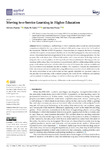Moving to e-Service Learning in Higher Education

Use this link to cite
http://hdl.handle.net/2183/30906Collections
- Investigación (FIC) [1678]
Metadata
Show full item recordTitle
Moving to e-Service Learning in Higher EducationDate
2022Citation
Dapena, A.; Castro, P.M.; Ares-Pernas, A. Moving to e-Service Learning in Higher Education. Appl. Sci. 2022, 12, 5462. https://doi.org/10.3390/app12115462
Abstract
[Abstract] Service Learning is a methodology in which students achieve academic and transversal competences related to the curriculum of a subject while performing a service for the benefit of the community. With the COVID-19 pandemic, it was necessary to reorganize the Service Learning activities developed in recent years so that they do not lose their pedagogical value and community service. This scenario has been an opportunity to kick-start an e-Service Learning experience. For that purpose, this work shows how different Information and Communication Technology tools are integrated into an online platform to develop both activities and assessment following an e-Service Learning methodology. Since the experience was performed with two collaborating entities serving people with autism and in two schools of the University of A Coruña, the tools are available not only to professors and students, but also to entities. Our experience includes the assessment of both competences and service satisfaction using different resources for virtual collaborative work. The main contribution of our work is that we have greatly simplified our previous project on-site and also the monitoring of the student’s progress, the work of both professors and students, and the analysis of results, providing a virtual service that responds to user needs.
Keywords
Autism spectrum disorder
Collaborative work
E-service learning
ICT
Online
Collaborative work
E-service learning
ICT
Online
Editor version
Rights
Atribución 4.0 Internacional






